
October 20
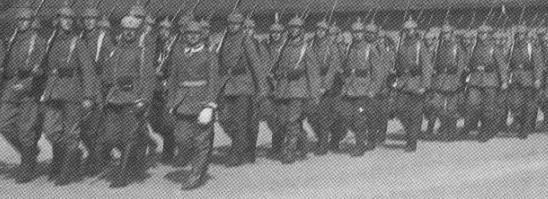
From Adolf Hitler's Mein Kampf:
At long last, the day came when we left Munich on war service. For the first time in my life, I saw the Rhine, as we journeyed westwards to stand guard before that historic German river against its traditional and grasping enemy. As the first soft rays of the morning sun broke through the light mist and disclosed to us the Niederwald Statue, with one accord the whole troop train broke into the strains of "Die Wacht am Rhein." I then felt as if my heart could not contain its spirit.
Click to Enlarge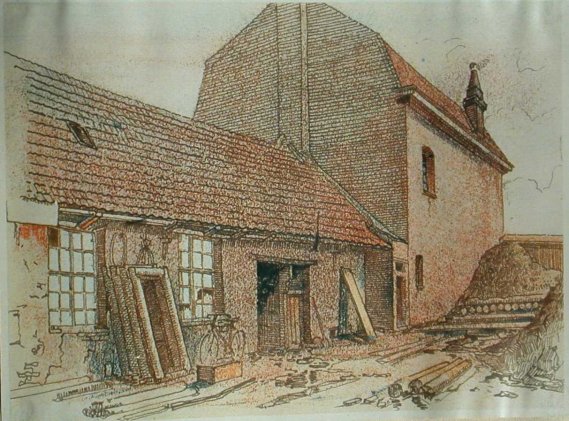
Fromelles Watercolor, 1915, by Hitler
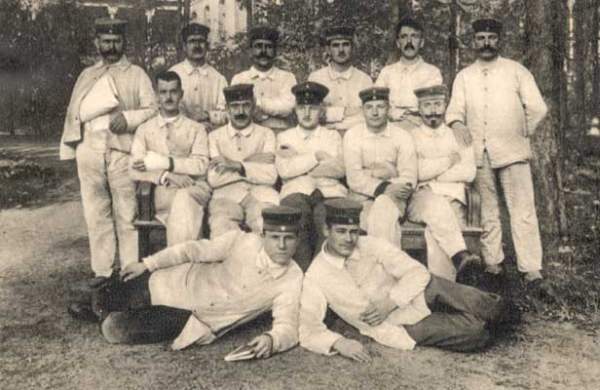
Volkishness: Generalmajor Erwin von Heimerdinger becomes the new Chancellor of the original Germanenorden. Dr. Gensch becomes Treasurer and Bernhard Koerner, Grand Keeper of Pedigrees. Philipp Stauff and Eberhard von Brockhusen are principle officers of the Berlin province. (THP)
1917 Russian Revolution: Appeal for Revolt Issued by Lenin:
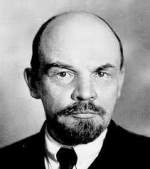
There is no doubt that the revolution in Russia has reached its turning point. In a country of peasants, under a revolutionary Republican Government, supported by the parties of the Revolutionary Socialists and the Menshevists, parties which until recently had the majority of the bourgeoisie behind them, there is rising today a peasants' rebellion. This fact has not surprised us - the Bolshevists. We have always maintained that the policy of the famous "Coalition" with bourgeoisie was a policy of an imperialist war, a policy of protecting capitalism and Junkerdom from the people. There exists in Russia, thanks to the treason of the Revolutionary Socialists and Menshevists, at the same time as the Government of the Soviets, a Government of capitalists and Junkers. Why should we be surprised that in Russia, with all the wretchedness brought by the continuation of the imperialist war upon the nation, a peasants' rebellion should break out and click out and spread. [For further details, Click here.]
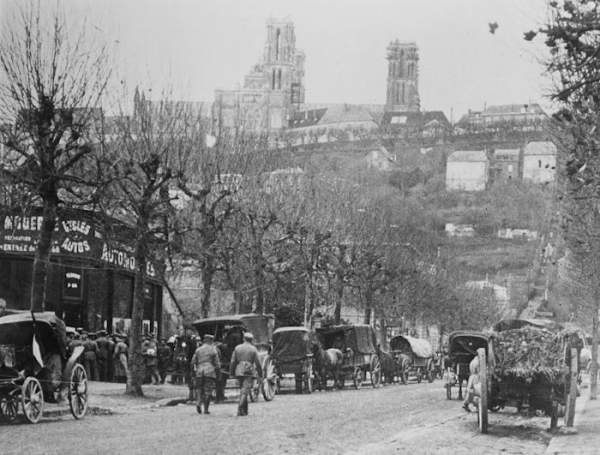
Up until mid-September 1918, the ruling Ottoman government, the Committee of Union and Progress (CUP) or Young Turks, still believed ultimate victory for the Central Powers was possible. After learning evidence to the contrary—that Bulgaria had sought and been granted an armistice in late September and that Germany was on the verge of seeking one as well—the CUP was in shock. They felt they had been deceived by the army’s chief commander, Enver Pasha, who had maintained repeatedly that all was well for Turkey and its allies. The fall of Bulgaria cut the Ottoman Empire off from the overland routes to Austria and Germany, and consequently all its access to fuel, ammunition, other supplies and reinforcements. As the Ottoman finance minister wrote in his diary in October: "If [Enver Pasha] had said five or six months ago that we were in so difficult a situation, naturally we would have . . . made a favourable separate peace at that time. But he concealed everything, and . . . he deluded himself and brought the country to this state."
After Mehmed Talaat (Turkey’s foremost political leader since February 1917) called his CUP cabinet together and engineered their collective resignation—including his own—in an attempt to curry favor with the Allies, Sultan Mehmed VI appointed a new cabinet under Field Marshal Ahemt Izzet Pasha, who was determined to be more acceptable to the Allies. In mid-October, the new Ottoman government dispatched Charles Townshend, a British general and prisoner-of-war, to approach the British in Greece. Townshend, who had surrendered to the Ottoman army at the town of Kut-al-Amara in Mesopotamia in the spring of 1916, had lived since then under house arrest on an island off Constantinople. Despite his prisoner-of-war status, he enjoyed relative freedom and moved in some of the highest Ottoman political circles.
Townshend’s boat arrived early on the morning of October 20 at the Greek island of Mitylene, where it rendezvoused with a British vessel. The Turkish position—as reported by Townshend and wired to the British Foreign Office in London—was that Britain should leave the Ottoman Empire with Syria, Mesopotamia and perhaps the Caucasus as well, provided these territories were allowed autonomy within a revamped empire structure that would more closely resemble a confederation of states. After he had wired this proposal, Townshend traveled by ship to the headquarters of the British naval commander in the Aegean Sea, Admiral Arthur Calthorpe, on the Greek island of Lemnos.
Townshend’s mission was to impress upon London the idea that the Turks were prepared to continue waging war if these generous peace terms were not offered. In fact, the Ottoman government was in a much weaker position, as the Allies occupied nearly all of their Arabian territories; this weakness was exploited in the actual armistice agreement, signed October 30, 1918, which effectively marked the end of Turkish dominance and the beginning of a new phase in the history of the Middle East. (History.com)
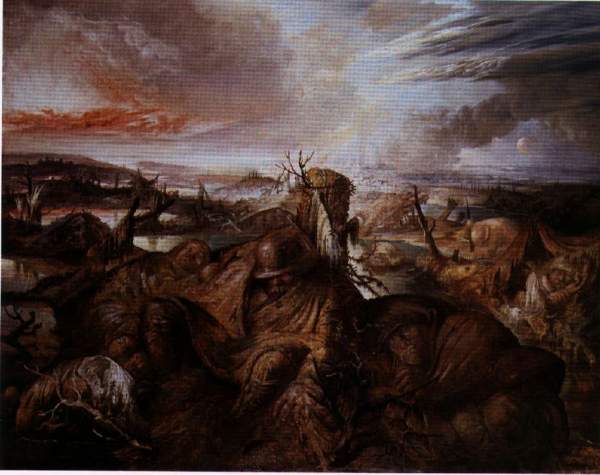
1918 World War I (Oct 15 - Nov 10): Gefreiter Adolf Hitler, blinded in a gas attack near Werwick on Oct 14, recovers in the Prussian Reserve Hospital at Pasewalk near Berlin. The doctors at this army hospital, on the cutting edge of medical treatments for gassed soldiers, provide Hitler with very good care, and his sight slowly and painfully begins to return to him over these few weeks. Hitler falls into a deep depression. After over four years on the front lines, his fighting days are over. In four years of war, the List Regiment has lost 3,754 dead, 8,795 wounded, with 678 taken prisoner. This is somewhat above the average for the German Armed Forces as a whole. [For further details, Click here.]
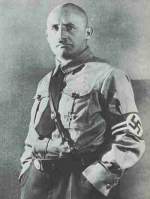
1922 Weimar: Julius Streicher, strongman of Nuremberg, joins the NSDAP, bringing with him his Deutsche Werksgemeinschaft and his newspaper Deutsche Volkwille. (Maser)
1935 Mao's Long March concludes:

Just over a year after the start of the Long March, Mao Zedong arrives in Shensi Province in northwest China with 4,000 survivors and sets up Chinese Communist headquarters. The epic flight from Chiang Kai-shek's Nationalist forces lasted 368 days and covered 6,000 miles, nearly twice the distance from New York to San Francisco. [For further details, Click here]
1937 Various: Death: Felix Warburg
Holocaust: Jewish market stalls and shops are picketed by Nazi police. (THP)
1938 Various
‘Pax Hitler’ Not Eternal, English Fear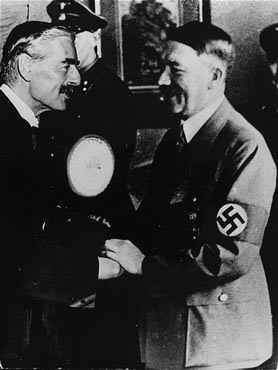
The possibility that Adolf Hitler may some day be succeeded by a more war-like Reichschancellor was cited tonight [Oct. 20] by a leading government spokesman in justification of Prime Minister Neville Chamberlain’s decision to increase British armaments, despite the Munich "Peace with Honor" which was to assure "peace in our time." [For further information, click here]
Czechoslovakia: The Nazis begin harassing Communists, Jews, and other anti-Nazis. (THP)
1939 World War II: From notes of a conference between Hitler and the Chief of the OKW, Keitel 'Regarding Future Relations of Poland to Germany':
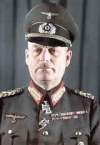
1) The Armed Forces will welcome it if they can dispose of administrative questions in Poland. On principle, there cannot be two administrations . . . .
3) It is not the task of the administration to make Poland into a model province or a model state of the German order or to put her economically or financially on a sound basis. The Polish intelligentsia must be prevented from forming a ruling class. The standard of living in the country is to remain low; we want only to draw labor forces from there. Poles are also to be used for the administration of the country. However, the forming of national political groups may not be allowed.
4) The administration has to work on its own responsibility and must not be dependent on Berlin. We do not want to do there what we do in the Reich. The responsibility does not rest with the Berlin Ministries since there is no German administration unit concerned. The accomplishment of this task will involve a hard racial struggle which will not allow any legal restrictions. The methods will be incompatible with the principles otherwise adhered to by us. The Governor General is to give the Polish nation only bare living conditions and is to maintain the basis for military security....
6) Any tendencies towards the consolidation of conditions in Poland are to be suppressed. The 'Polish muddle' must be allowed to develop. The Government of the territory must make it possible for us to purify the Reich territory from Jews and Poles too. Collaboration with new Reich 'provinces (Posen and West Prussia) only for resettlements (compare Himmler mission). Purpose: Shrewdness and severity must be the maxims in this racial struggle in order to spare us from going to battle on account of this country again.

1940 World War II: Barbarossa: German troops reach the approaches to Moscow.
[See: Was Adolf Hitler a 'Great' Military Leader?]1941 World War II: Various:
France:
Yugoslavia: German soldiers, with the assistance of some of the local inhabitants, begin the massacre of thousands of civilians in Kragujevac in Nazi-occupied Serbia. [For further information, click here]
Countdown to Infamy: War Department to Hawaiian Department Commanding General: "Following War Department estimate of Japanese situation for your information. Tension between the United States and Japan remains strained but no, repeat no, abrupt change in Japanese foreign policy seems imminent."
[See: Did FDR Have Foreknowledge of Pearl Harbor?]Averell Harriman to Winston Churchill:
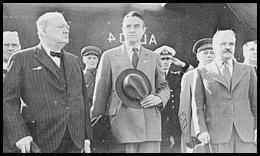
The interventionists have increased in number and are more confident and aggressive. Many of the less violent isolationists have become reconciled to the inevitability of war. Some of the more violent isolationists like Lindbergh have been discredited in the public eye. Others are running to cover. And yet, with all this trend, it is not at all clear what or when something will happen to kick us into it. The news on Saturday of the torpedoing of the Kearney did not cause even a ripple. It seems that the public had expected—and were thoroughly prepared for—such occurrences. (Harriman)
[See: Did Hitler Have Foreknowledge of Pearl Harbor?]From The Blast of War: 1939-1945 by Harold Macmillan:
All through the late summer and autumn months the anxieties of the British Government grew. Russia might be defeated, and Hitler free to turn again to the final assault upon Britain. Our Far East possessions were under dire threat from Japan. Yet we had no choice but to follow American policies. After all, we were largely dependant on their active assistance for continuing the war in Europe. We knew we had the sympathy of the President and those immediately around him. For Roosevelt had for many years been awake to the dangers of Hitler and his dreams. With consummate skill he had guided a Congress and people who were still isolationists by tradition.
He had persuaded them, step by step, to amend or allow him to disregard the neutrality legislation in Britain's favor. He had effected the exchange of the West Indian bases for the fifty destroyers—obsolescent, but essential to our needs. He had maintained guard over half the Atlantic against the German submarines. He had solved our pressing financial problems by the institution of Lend-Lease. Yet he was by no means all-powerful. Congress was still suspicious. There had been the greatest difficulty in carrying or renewing compulsory military service. Churchill therefore had to be careful. He must not appear to be trying to coax the Americans into war; for the most wounding accusation that could be made against an American politician was that he had been cajoled by the sly enticements of the subtle "Britishers."
1942 World War II: The US government orders the seizure of Nazi German banking operations in New York which were being conducted by Prescott Bush. The US Alien Property Custodian took over the Union Banking Corporation and its stock shares, all of which were owned by E. Roland "Bunny" Harriman, Bush, three Nazi executives and two other Bush associates. (THP)
1943 World War II: The United Nations (UN) War Crimes Commission is set up.
1944 World War II: MacArthur returns
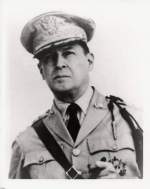
After advancing island by island across the Pacific Ocean, U.S. General Douglas MacArthur wades ashore onto the Philippine island of Leyte, fulfilling his promise to return to the area he was forced to flee in 1942.
The son of an American Civil War hero, MacArthur served as chief U.S. military adviser to the Philippines before World War II. The day after Pearl Harbor was bombed on December 7, 1941, Japan launched its invasion of the Philippines. After struggling against great odds to save his adopted home from Japanese conquest, MacArthur was forced to abandon the Philippine island fortress of Corregidor under orders from President Franklin Roosevelt in March 1942. Left behind at Corregidor and on the Bataan Peninsula were 90,000 American and Filipino troops, who, lacking food, supplies, and support, would soon succumb to the Japanese offensive.
After leaving Corregidor, MacArthur and his family traveled by boat 560 miles to the Philippine island of Mindanao, braving mines, rough seas, and the Japanese navy. At the end of the hair-raising 35-hour journey, MacArthur told the boat commander, John D. Bulkeley, "You've taken me out of the jaws of death, and I won't forget it." On March 17, the general and his family boarded a B-17 Flying Fortress for northern Australia. He then took another aircraft and a long train ride down to Melbourne. During this journey, he was informed that there were far fewer Allied troops in Australia than he had hoped. Relief of his forces trapped in the Philippines would not be forthcoming. Deeply disappointed, he issued a statement to the press in which he promised his men and the people of the Philippines, "I shall return." The promise would become his mantra during the next two and a half years, and he would repeat it often in public appearances.
For his valiant defense of the Philippines, MacArthur was awarded the Congressional Medal of Honor and celebrated as "America's First Soldier." Put in command of Allied forces in the Southwestern Pacific, his first duty was conducting the defense of Australia. Meanwhile, in the Philippines, Bataan fell in April, and the 70,000 American and Filipino soldiers captured there were forced to undertake a death march in which at least 7,000 perished. Then, in May, Corregidor surrendered, and 15,000 more Americans and Filipinos were captured. The Philippines were lost, and the U.S. Joint Chiefs of Staff had no immediate plans for their liberation.
After the U.S. victory at the Battle of Midway in June 1942, most Allied resources in the Pacific went to U.S. Admiral Chester Nimitz, who as commander of the Pacific Fleet planned a more direct route to Japan than via the Philippines. Undaunted, MacArthur launched a major offensive in New Guinea, winning a string of victories with his limited forces. By September 1944, he was poised to launch an invasion of the Philippines, but he needed the support of Nimitz's Pacific Fleet. After a period of indecision about whether to invade the Philippines or Formosa, the Joint Chiefs put their support behind MacArthur's plan, which logistically could be carried out sooner than a Formosa invasion.
On October 20, 1944, a few hours after his troops landed, MacArthur waded ashore onto the Philippine island of Leyte. That day, he made a radio broadcast in which he declared, "People of the Philippines, I have returned!" In January 1945, his forces invaded the main Philippine island of Luzon. In February, Japanese forces at Bataan were cut off, and Corregidor was captured. Manila, the Philippine capital, fell in March, and in June MacArthur announced his offensive operations on Luzon to be at an end; although scattered Japanese resistance continued until the end of the war, in August. Only one-third of the men MacArthur left behind in March 1942 survived to see his return. "I'm a little late," he told them, "but we finally came." (History.com)
US troops enter Aachen after a savage pounding by American artillery. Little is left standing and the city lies in ruins, but the German defenders continue to fight fiercely, often to the last man.
FDR to Churchill:
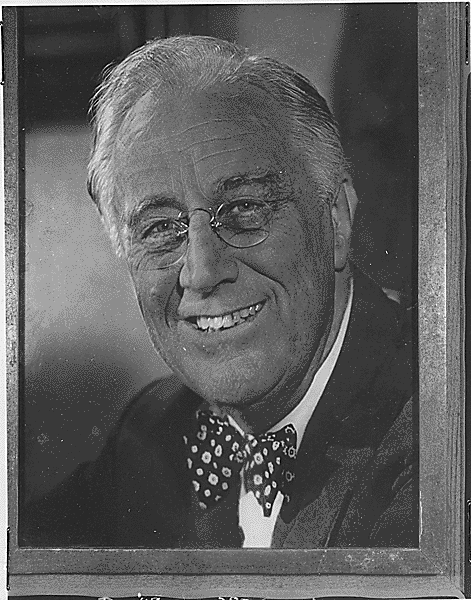
I think until the French set up a real zone of interior that we should make no move towards recognizing them as a Provisional Government. The enlargement of the Consultative Assembly, which has already been extended and made more representative, is almost as important, and I should be inclined to hang recognition on the effective completion of both these acts. I would not be satisfied with de Gaulle merely saying that he was going to do it.
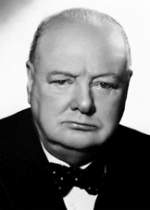
Churchill to Stalin:
Eden and I have come away from the Soviet Union refreshed and fortified by the discussions which we had with you, Marshal Stalin, and with your colleagues. This memorable meeting in Moscow has shown that there are no matters that cannot be adjusted between us when we meet together in frank and intimate discussion. May we soon meet again.
1947 Congress investigates Reds in Hollywood:

On October 20, 1947, the notorious Red Scare kicks into high gear in Washington, as a Congressional committee begins investigating Communist influence in one of the world's richest and most glamorous communities: Hollywood.
After World War II, the Cold War began to heat up between the world's two superpowers—the United States and the communist-controlled Soviet Union. In Washington, conservative watchdogs worked to out communists in government before setting their sights on alleged "Reds" in the famously liberal movie industry. In an investigation that began in October 1947, the House Un-American Activities Committee (HUAC) grilled a number of prominent witnesses, asking bluntly "Are you or have you ever been a member of the Communist Party?" Whether out of patriotism or fear, some witnesses—including director Elia Kazan, actors Gary Cooper and Robert Taylor and studio honchos Walt Disney and Jack Warner—gave the committee names of colleagues they suspected of being communists.
A small group known as the "Hollywood Ten" resisted, complaining that the hearings were illegal and violated their First Amendment rights. They were all convicted of obstructing the investigation and served jail terms. Pressured by Congress, the Hollywood establishment started a blacklist policy, banning the work of about 325 screenwriters, actors and directors who had not been cleared by the committee. Those blacklisted included composer Aaron Copland, writers Dashiell Hammett, Lillian Hellman and Dorothy Parker, playwright Arthur Miller and actor and filmmaker Orson Welles.
Some of the blacklisted writers used pseudonyms to continue working, while others wrote scripts that were credited to other writer friends. Starting in the early 1960s, after the downfall of Senator Joseph McCarthy, the most public face of anti-communism, the ban began to lift slowly. In 1997, the Writers' Guild of America unanimously voted to change the writing credits of 23 films made during the blacklist period, reversing—but not erasing—some of the damage done during the Red Scare. (History.com)
Edited by Levi Bookin (Copy editor) Click to join 3rdReichStudies Disclaimer: This site includes diverse and controversial materials--such as excerpts from the writings of racists and anti-Semites--so that its readers can learn the nature and extent of hate and anti-Semitic discourse. It is our sincere belief that only the informed citizen can prevail over the ignorance of Racialist "thought." Far from approving these writings, this site condemns racism in all of its forms and manifestations.
levi.bookin@gmail.com










Fair Use Notice: This site may contain copyrighted material the use of which has not always been specifically authorized by the copyright owner. We are making such material available in our efforts to advance understanding of historical, political, human rights, economic, democracy, scientific, environmental, and social justice issues, etc. We believe this constitutes a "fair use" of any such copyrighted material as provided for in section 107 of the US Copyright Law. In accordance with Title 17 U.S.C. Section 107, the material on this site is distributed without profit to those who have expressed a prior interest in receiving the included information for research and educational purposes. If you wish to use copyrighted material from this site for purposes of your own that go beyond 'fair use', you must obtain permission from the copyright owner.
Please Note: The list-owner and the moderator of 3rdReichStudies are not responsible for, and do not necessarily approve of, the random ads placed on our pages by our web server. They are the unfortunate price one pays for a 'free' website.



